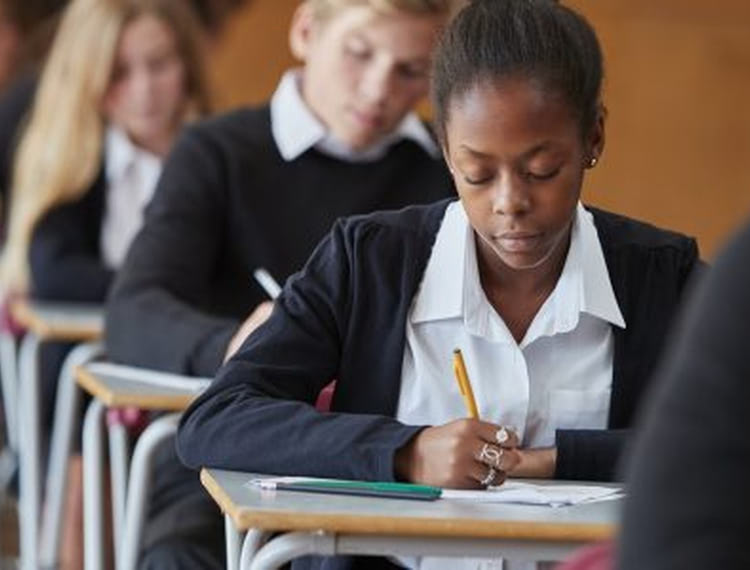GCSE, AS and A level exams 2021 will go ahead with 3 week delay – Sector Response

#ExamsCovidDebate – Exams will go ahead next summer, underpinned by contingencies for all possible scenarios. Students to be given more time to prepare for 2021 exams
Students now have more time to prepare for their exams next year, as most AS, A levels and GCSEs will be held three weeks later to help address the disruption caused by the pandemic.
The Prime Minister and Education Secretary are clear that exams will go ahead, as they are the fairest and most accurate way to measure a pupil’s attainment.
Today (12 October), the government is announcing the summer exam series will start on 7 June and end on 2 July for almost all AS/A levels and GCSEs.
Results days are Tuesday 24 August for A/AS levels and Friday 27 August for GCSEs so students will start the following academic year as normal.
It is expected that for the majority of vocational and technical qualifications that are taken alongside or instead of GCSEs, AS and A levels, awarding organisations will look to align timetables with 2021 exams.
The government continues to prioritise children’s education in its response to the pandemic, building on the remarkable efforts of teachers, students and parents in keeping pupils learning at school and at home.
 Education Secretary Gavin Williamson said:
Education Secretary Gavin Williamson said:
“Fairness to pupils is my priority, and will continue to be at the forefront of every decision we take in the lead up to exams next summer. Exams are the fairest way of judging a student’s performance so they will go ahead, underpinned by contingency measures developed in partnership with the sector.
“Students have experienced considerable disruption and it’s right we give them, and their teachers, the certainty that exams will go ahead and more time to prepare.
“Combined with our £1 billion catch-up programme and the changes proposed by Ofqual to free up teaching time, the changes I am announcing today give young people the best chance of being ready for their exams without undermining the value of the qualifications they receive.
“I will continue to work closely with stakeholders and I’m grateful for the commitment and willingness that’s been shown in delivering this additional time to ensure young people have the best opportunity to succeed.”
The announcement comes as members of the House of Commons Petitions Committee debate two e-petitions relating to exams during Covid-19, to review the decision to use previous data to calculate exam grades, and to reduce curriculum content for Year 10 and 12 students who will sit exams in 2021.
Sector Response
 Dr Philip Wright, director general at JCQ, said:
Dr Philip Wright, director general at JCQ, said:
“JCQ and the exam boards will do everything we can to help deliver a successful exam series in 2021. We will work with and need the support of DfE and Ofqual and stakeholders on three fronts:
- To support student health and well-being;
- To support schools and colleges who may face administrative and capacity challenges; and
- To recruit many thousands of additional examiners, whose commitment and dedication will be crucial. The vast majority of examiners will need to be working teachers and be available into the early summer holidays.
‘We welcome the Education Secretary’s request that Ofqual work with him, schools and further education leaders, unions and the higher education sector to develop these arrangements. They will need time, energy and resources from all those involved in the examination system to deliver these timescales successfully.
‘It’s important to recognise that this approach requires trade-offs. So a significant delay to the start of exams without significantly delaying results means that exams will have to take place in a compressed window, rather than being spread out to maximise a student’s chances of sitting at least one paper per subject.
‘Even with a compressed exam window, delivering GCSE results on 27th August will be a challenge. We’ve raised our concerns with Ofqual and the DfE and agreed regular reviews to see whether good progress is being made to overcome the challenges.’
Dr Wright continues: ‘JCQ and the exam boards will provide our full support, while continuing to review developments and stand ready to make recommendations for change if we think they are in the best interests of students, schools and colleges. ‘We will be consulting with stakeholders on our proposed timetable and will do so shortly. Any changes to the schedule will need to be kept within the dates specified by the Secretary of State and Ofqual.’
 Kate Green MP, Labour’s Shadow Secretary of State for Education, said:
Kate Green MP, Labour’s Shadow Secretary of State for Education, said:
“The government have finally listened to Labour’s call for exams to be delayed, but they could have done this weeks ago to give schools more time to prepare.
“A delay is necessary but not enough to make exams fair for all.
“The government must ensure that every pupil gets the support they need to catch up, and that they look at other possibilities to make exams fairer.”
 Dame Glenys Stacey, Interim Chief Regulator, Ofqual said:
Dame Glenys Stacey, Interim Chief Regulator, Ofqual said:
“During the pandemic, teachers and students are having to work in exceptional ways, to catch up and keep up with learning. These arrangements optimise the time now available for that, providing the best part of three extra weeks extra teaching and learning for many. And with this and the subject content for these qualifications now settled, teachers and students have some welcome certainty in these uncertain times.
“Of course, we will need contingency plans. We are discussing with government, exam boards and the sector, the detail of that – taking into account the risk of disruption at an individual, local and regional level.”
 David Hughes, Chief Executive, AoC said:
David Hughes, Chief Executive, AoC said:
“We welcome the commitment to running exams next year as the plan A and believe that, in the main, students prefer to sit exams and carry out assessments in order to achieve their qualifications. Two major issues arise from this plan. The first is how the system supports students who have lost learning because of the pandemic. The extra three weeks of teaching time will help, as will the catch-up package which college students can benefit from. But it is not enough, particularly given the digital poverty that too many students suffer from. We would urge DfE to continue to discuss and address this throughout the academic year as we begin to appreciate the impact on students.
“The second issue is there is a risk that some or all students will not be able to sit the exams – whether that be individual students too ill to sit exams, whole classes, institutions shut down, or regions in lockdown. Contingency plans for these scenarios are critical and we will continue our discussions with DfE and Ofqual to help agree them. One plan could include the development of a national system of external written assessment and teacher assessment as a fallback option. Others plans need to focus on how adjustments can be made to ensure that the process is as fair as possible to all students.
“Colleges still have the autumn series to contend with and many are expecting higher numbers of GCSE English and maths resit candidates in November. Many colleges will have over 500 candidates and some have seen their November entries more than double. This increase in numbers is costly, disruptive and could have serious public health implications. At the very least, DfE should extend the support funding promised for the additional autumn exams to cover the additional costs for college GCSE resits.
“Today’s announcement only covers academic subjects. DfE, Ofqual and awarding organisations need to work with colleges and other providers to ensure technical and vocational students can complete courses in summer 2021 – this is of course a bigger challenge because assessment is more sophisticated and often work-based. Clarity on the adaptations to be put in place for many qualifications is urgently needed by students and colleges.”
Cllr Judith Blake, Chair of the Local Government Association’s Children and Young People Board, said:
“We appreciate greater certainty given to exam dates next year, but further consideration needs to be given about whether a single exam is still the fairest way to assess pupils who have been most adversely affected by not being able to go to school.
“Equality of access to laptops and the internet for online learning have been an issue for pupils, while the closure of schools will have an impact on all children.
“A fair and comprehensive assessment is essential in this most extraordinary year. Previous results and teacher assessments need to be taken into account to ensure sure children don’t miss out because of a virus over which they have not control, while the possible impact of local lockdowns and self-isolation levels on the quality of pupil education also needs to be considered.
“The needs of young people who have fallen behind in their schoolwork through no fault of their own should be our first priority. For these reasons, the fairness of a single, high stakes exam needs to be carefully considered.
“Councils have worked hard with schools to keep pupils learning in the classroom and at home during the pandemic and want to ensure every young person’s exams are subject to a fair grading system given the unprecedented circumstances. We look forward to seeing further details on the contingency measures outlined in the announcement.”
Implement a fairer assessment system for exams to ensure the chaos of the summer is not repeated, say unions
Responding to the announcement by education secretary Gavin Williamson that GCSEs and A-level exams will be delayed by three weeks, the union called for a fairer system that relies less on exams.
The union also said that the current situation highlighted the need for an overhaul of exams and assessments, and a move to a system of post-qualifications admissions, where students apply to university after their results.
 UCU general secretary Jo Grady said:
UCU general secretary Jo Grady said:
‘Staff and students have worked incredibly hard in unprecedented circumstances this year and deserve better than the continued mess that the Westminster government has overseen.
‘The government needs to accept it got things badly wrong back in August and work with staff to ensure a proper system of teacher-moderated grades instead of exams, in case we see a continued rise in Covid-19 cases and more widespread lockdowns.
‘Whilst a delay in the start of exams in 2021 to allow students and teachers more time to complete courses is welcome, it is vital to consider how this will affect teacher workload and timetable planning. Longer term, the current situation shows that we must seriously look at moving to a system of post-qualifications admissions, where students apply to university after their results.
‘Without substantial support from the government, and a commitment to genuine reform, further uncertainty around exams and marking systems will simply create further chaos for students and unbearable workloads for staff’.
 Dr Mary Bousted, Joint General Secretary of the National Education Union, said:
Dr Mary Bousted, Joint General Secretary of the National Education Union, said:
“Today’s announcement amounts to a dereliction of duty by government to pupils, parents and education professionals. Pupils taking GCSE and A levels next summer are in a terrible position. They have missed five months of in-school teaching – a loss which impacts most severely on disadvantaged pupils, 700,000 of whom have no access to the internet which denies them access to remote learning. Many pupils are missing further schooling, now, as they isolate at home waiting for COVID test results. It is completely unrealistic, and unfair, to expect these pupils to take exams which make no compensation for disruption to school teaching time.
“In unprecedented joint advice with the other teacher and leader unions, the NEU advised Gavin Williamson that GCSE and A level exams must be altered to include greater choice of topics, which would enable pupils to be examined on what they have, not what they have not, been taught. We continue to believe that greater optionality in exam papers, along with fewer exams, will be essential to support fairness and to decrease the already very high rates of pupil stress which are being suffered this year.
“Why are the government consulting, now, on how exams will be graded and what the fall back would be if exams cannot be taken? Ministers have had months to plan for these contingencies which, as COVID levels rise in communities, become ever more possible.
“Today’s announcement is yet another appalling example of political ideology trumping practical reality. It demonstrates that this is not a government which is interested in levelling up because the impact of these decisions will impact most severely on the most disadvantaged.
“It is critical for avoiding the great unfairness felt by many students last summer that government reconsider this position immediately and introduce greater topic optionality into the exams. If government will not reconsider and change its mind quickly, members tell us that exams, even with greater optionality, are no longer tenable. In which case, the only route to fairness would be a complete cancellation of exams and the use of robustly moderated, externally quality-assured teacher judgements.”
 Patrick Roach, General Secretary of NASUWT-The Teachers’ Union, said:
Patrick Roach, General Secretary of NASUWT-The Teachers’ Union, said:
“The announcement of a three week delay to the timetable for most GCSE and A level exams next year will not provide meaningful additional time for students whose preparation for examinations has already been disrupted over a number of months.
“Moving the timetable is unlikely to create much additional teaching time per subject, will place significant pressure on the awarding system and the additional time pressures in turning around exam papers risks a reduction in the number of people willing to work as exam markers.
“Reducing content in examinations and enabling greater scope for students to answer optional questions must also be strongly considered in order to reduce the pressures on students and teachers.
“It is of equal concern that the Education Secretary has failed today to set out any detail on what contingency arrangements are to be put in place should exams not be able to go ahead in the revised timetable next year or to clarify what measures will be put in place to ensure pupils are not disadvantaged in any way due to the high likelihood of further disruption over this academic year.
“We cannot risk a repeat of the chaos which engulfed this year’s exam results and it is imperative that a range of robust and transparent contingency measures are developed, in consultation with the teaching profession, to address the wide range of possible scenarios schools and pupils may find themselves in over the coming year which could impact on exams and the fair assessment of pupils’ abilities.”
The autumn exam series – involving more than 20,000 entries – is already underway
Schools and colleges have shown exams can be held, even in areas of local restriction. Given rising case numbers and the battle to suppress the virus, it is also right that there is consideration of the range of scenarios which might impact students’ ability to sit exams and develop contingency plans.
The Education Secretary has today written to Ofqual to ask the regulator to work closely with him, school and further education leaders, exam boards, unions and the higher education sector to develop these arrangements.
House of Commons Written Statement made by The Secretary of State for Education (Gavin Williamson):
This government has always made the education of young people a priority. We are determined to make sure that when the time comes, young people are able to take the next step in their lives with the knowledge and qualifications they need.
We want to build on the remarkable efforts of teachers, students and parents across the country as children return to school – and education – through these challenging times. We must continue to do all we can to minimise the impact of the coronavirus pandemic on all those who are studying at school or college. I know that students due to sit exams next summer have experienced considerable disruption to their education, our £1 billion Covid-19 catch-up package will help to tackle the impact of lost teaching time. It is right that our approach to exams and assessments in 2021 also reflects these students’ experience.
Today I can confirm that GCSE, AS and A level exams in 2021 will go ahead, with most exams moved back 3 weeks next year to give students more time to prepare and a chance to catch up on education lost due to COVID-19. We know that exams are the fairest way of measuring a student’s abilities and accomplishments, including the most disadvantaged.
We want to give our young people the opportunity next summer to demonstrate what they know and can do. The main exam series will start on 7 June and end on 2 July. One maths and one English GCSE exam will take place before the May half-term, giving any Year 11 pupils who need to self-isolate during the exam period the best possible chance of still sitting a paper in each of these core subjects. Some A and AS levels with typically very small numbers of students entering will also be scheduled in the days just before half term.
It is expected that for the majority of vocational and technical qualifications that are taken alongside or instead of GCSEs, AS or A levels, awarding organisations will look to align timetables with 2021 exams. Results days for AS/A levels and GCSEs will fall on Tuesday 24 August and Friday 27 August respectively, with students taking vocational and technical qualifications needed for progression to further or higher education receiving their results no later than their peers.
I am also confirming today the subject-level changes to exams and assessments outlined in the public consultation carried out earlier this year by the exams’ regulator, Ofqual. These changes to exams and assessments next year will support teachers and students by freeing up valuable teaching time.
Ofqual has also consulted on how assessments of vocational and technical qualifications will be adapted to free up teaching time and respond to any future public health measures. Schools and colleges have shown exams can be held, even in areas of local restriction, in the autumn exam series which is currently taking place.
Exams next year will be supported by contingencies for all scenarios. Today I have written to Ofqual to ask the regulator to support Government in developing these arrangements, engaging closely with the school and further education leaders, teachers, exam boards, unions and the higher education sector.
The results of this planning and ongoing discussions with the sector will be published later in the Autumn. I am grateful for the commitment and willingness that has been shown by groups across the sector in enabling and delivering this additional teaching time next year, helping to ensure that young people have the best opportunity to succeed.
Our approach will support students to prepare for exams with confidence and ensure they have the best chance of receiving the qualifications they deserve
Gavin Williamson, Secretary of State for Education
The Government will engage widely with the sector over the next six weeks to identify any risks to exams at a national, local, and individual student level, and consider measures needed to address any potential disruption. This could be a student unable to sit exams due to illness or self-isolation, or schools affected by a local outbreak during the examination season meaning centres cannot open.
More detail will be published later in the Autumn, to ensure students have confidence that they will be fairly treated in terms of assessment in 2021.
One maths and one English GCSE exam will be held just before the May half-term, giving any Year 11 pupils who are affected by Covid-19 the best possible chance of still sitting a paper in each of these core subjects.
The government is also confirming today that no further subject-level changes to exams and assessments will be made for GCSEs, AS and A levels. The changes outlined by Ofqual are designed to release time for teaching and to take account of public health considerations. This confirmation gives teachers, school leaders and pupils clarity on what will be assessed in exams next summer. This follows a public consultation carried out by the exams’ regulator, Ofqual, earlier this year. Ofqual has also consulted on how assessments of vocational and technical qualifications will be adapted to free up teaching time and respond to any future public health measures.
The £1 billion Covid catch-up fund will help to tackle the impact of lost teaching time. The programme includes a £650 million catch-up premium to help schools support all pupils and £350 million National Tutoring Programme for disadvantaged students.











Responses